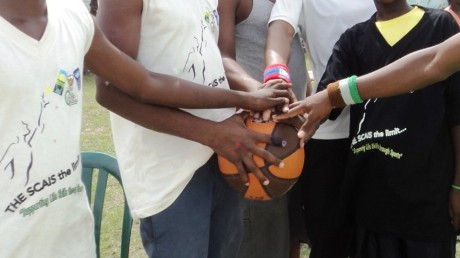Not long ago a high school diploma seemed out of reach for Rudolph Belisle, but now the 18-year-old is making plans to attend college.
Along with 89 other young men, Rudolph is a graduate of a youth engagement programme, implemented by the United Nations Development Programme (UNDP), that provides pathways to employment and re-entry into formal education for marginalized youths.
Rudolph is from the socio-economically deprived Southside of Belize City, the most violent area of the country where homicide rates have soared in recent years. At the heart of this violence are criminal gangs linked to the drug trade. Growing up Rudolph watched some of his acquaintances join the notorious George Street Gang as a strategy for survival.
Rudolph never joined the gang, but he got into trouble with police when he took part in a burglary with a group of friends. After serving two months in a youth boot camp, Rudolph joined the Southside Youth Success Project (SYSP) and started working to turn his life around.
“The Southside Youth Success Project helped me out a lot,” Rudolph says. “It helped me to reflect on my life, taught me to be independent and provided me with skills to find a job.”
Funded by the US State Department and targeting boys between the ages of 14 and 17, the SYSP is a training and self-development programme conducted at the Southside Drop-In Centre in Belize City. One of its successes was the establishment of a mentoring and training service, through the development of strong partnerships with the business community, NGOs and Government ministries.
After five months of training and apprenticeship, Rudolph landed a full-time job as a customer service representative with Ready Call Centre. He is currently applying for enrolment in night school to get his high school diploma while working during the day. He plans to continue on to tertiary level education once he has received his diploma.
Besides vocational training, the SYSP helps participants improve their time management skills and provides them with avenues for recreation through extra-curricular activities such as swimming, karate, chess and table tennis. It also helps solve practical problems that could be barriers to employment. For instance, project participants who did not previously have legal identification papers were given assistance to obtain birth certificates and social security cards.
In 2013, the Project published “The Good, The Bad, The Nobody Road”, a compilation of life stories of some of the trainees. The book now serves as an advocacy tool for educators and the criminal justice system to consider the impacts of their practices on this vulnerable population.
Rudolph says the SYSP taught him job skills, but also life skills that will help him navigate the future. “I would have gone right back to my old life and would most likely now be serving time,” he says. “The project has given me and so many of my classmates our independence. When you are done the programme, if you are not a changed person it is because you did not want to change.”

